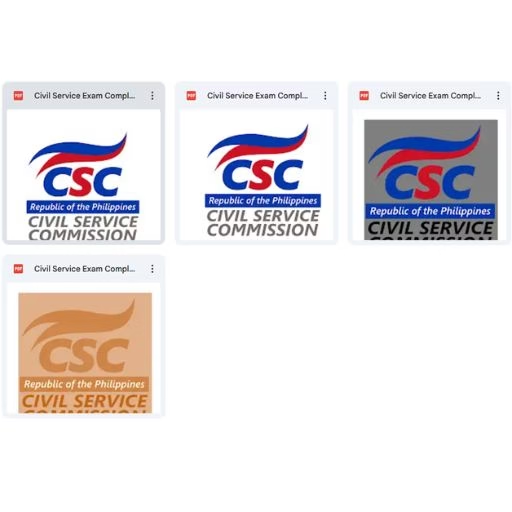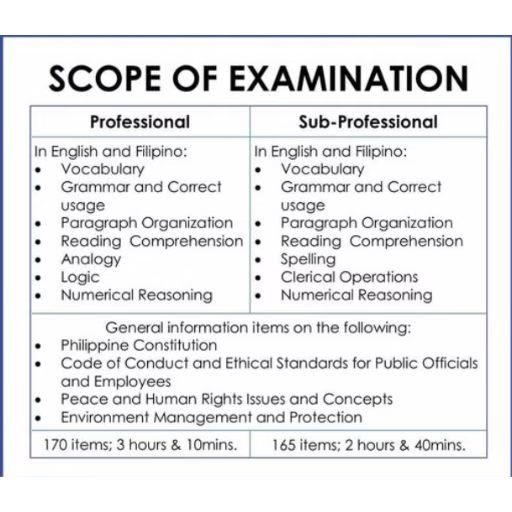
A Comprehensive Guide to Philippine Civil Service Exam Topics and Review Materials

Introduction to the Philippine Civil Service Exam
The Philippine Civil Service Exam (CSE) is a pivotal assessment designed to evaluate the qualifications of individuals aspiring to work in various government positions. The significance of this examination lies in its role as a gatekeeper for entry into the civil service, ensuring that only qualified candidates can undertake responsibilities in public service. The CSE is administered by the Civil Service Commission (CSC) and is a crucial step for those looking to secure stable employment within the government sector.
Eligibility to take the Civil Service Exam is determined by specific criteria. Applicants must be Filipino citizens, of legal age, and possess at least a bachelor’s degree from a recognized educational institution. Furthermore, there may be particular requirements based on the level of the exam, whether it be Professional or Sub-Professional. Understanding these eligibility criteria is essential for prospective candidates to gauge their suitability for taking the exam.
The structure of the Philippine Civil Service Exam comprises multiple-choice questions that measure various competencies, including analytical thinking, verbal ability, numerical ability, and general knowledge about the Philippine Constitution and governance. Typically, the Professional level exam consists of 170 items, while the Sub-Professional level consists of 165 items. Each applicant is allotted a specific time to complete the exam, and test day procedures are strictly regulated to maintain integrity and consistency.
Candidates can expect a highly competitive environment on exam day, which demands not only knowledge but also effective time management and problem-solving abilities. Preparation should involve reviewing relevant materials, understanding the exam format, and practicing with sample questions. As the Philippine Civil Service Exam continues to play a crucial role in public sector employment, familiarizing oneself with its requirements and structure is a fundamental step for all aspiring government employees.
Exam Structure and Format
The Philippine Civil Service Exam is a structured assessment designed to evaluate the competence of individuals aspiring to enter government service. Understanding the exam’s structure and format is critical for effective preparation. The examination is generally divided into several key sections, including the General Ability Test, General Knowledge, and Analytical Ability.
The General Ability Test assesses a candidate’s quantitative and verbal skills, focusing on reasoning, logic, and comprehension. This section typically includes multiple-choice questions that require test-takers to demonstrate their problem-solving abilities. The General Knowledge portion evaluates a candidate’s awareness of current events, historical facts, and basic principles of governance, again featuring a series of multiple-choice questions tailored to gauge factual knowledge and comprehension.
Critical to note is the Analytical Ability section, which measures a candidate’s ability to reason, analyze, and deduce information. This section often involves multiple-choice questions that require candidates to interpret data or situational contexts effectively. Completing these sections typically takes a set amount of time, facilitating prompt and precise answering. The total time allotted for the entire examination varies, usually lasting several hours and segmented according to each section’s requirements. Each candidate must manage their time carefully to answer all questions within the set limits.
To summarize, the structure and format of the Philippine Civil Service Exam play a significant role in assessing a candidate’s readiness for government service positions. By familiarizing themselves with the diverse sections, types of questions, and time constraints, candidates can devise appropriate study strategies. This understanding ultimately aids in approaching the exam with confidence and clarity.
Key Topics Covered in the Exam
The Philippine Civil Service Exam is a crucial assessment designed to evaluate the competency of individuals aspiring to work in public service. To successfully navigate this examination, candidates must be well-versed in several key topics, which are divided into distinct categories. Each subject area entails specific focus points that are essential for a comprehensive understanding and effective preparation.
One of the primary subjects covered is Mathematics. Candidates should prepare for questions related to basic arithmetic, percentages, ratios, and word problems. A solid grasp of these mathematical concepts is necessary, as they are frequently tested and form the foundation for more complex problem-solving scenarios that could arise in a civil service position.
English proficiency is another critical area, where test-takers need to focus on grammar, vocabulary, reading comprehension, and sentence construction. Mastery in English not only helps candidates understand questions better but also aids in formulating clear responses. Practice through reading various texts and completing exercises can significantly improve one’s command of the language.
Filipino, the national language, is equally important in the examination. Individuals should be familiar with Filipino vocabulary, grammar, and usage in different contexts. Comprehension skills in Filipino are assessed, requiring candidates to read passages and respond to questions based on their understanding of the material.
Lastly, current events hold a prominent place in the Civil Service Exam. Candidates should stay informed about national and global developments, political issues, economic trends, and societal changes. Knowledge in this area not only assists in answering relevant questions but also equips candidates with an understanding of the environment in which they may be working.
In summary, a well-rounded preparation focused on these key topics—Mathematics, English, Filipino, and current events—will significantly enhance a candidate’s prospects for success in the Philippine Civil Service Exam.
Review Materials and Resources
Preparing for the Philippine Civil Service Exam requires a structured approach and access to appropriate review materials and resources. A combination of books, online courses, study guides, and practice exams can significantly enhance the study experience, ensuring that candidates cover the essential topics thoroughly.
One of the most effective resources to consider is the comprehensive collection of review books available on the market. Titles such as “Civil Service Exam Review Guide” and “Philippine Civil Service Exam Made Easy” are highly recommended. These books typically provide detailed content on relevant subjects like verbal reasoning, numerical reasoning, and general information. They also offer practice questions that reflect the actual exam format, which is instrumental in familiarizing candidates with question types and difficulty levels.
In addition to traditional books, online courses have gained popularity among candidates. Platforms like Coursera and Udemy offer specialized courses focused on the civil service examination. These courses often come with video lectures, quizzes, and interactive tools designed to facilitate learning. Furthermore, many of them allow candidates to learn at their own pace, which can be particularly beneficial to those balancing work and study.
Study guides also serve as practical resources, as they condense essential information and offer strategies for effective exam preparation. A good study guide can provide summaries of key topics, mnemonics, and test-taking strategies tailored for the civil service exam.
Lastly, taking practice exams is crucial for maximizing one’s potential. Websites dedicated to civil service exam preparation frequently offer free or low-cost practice tests. These exams simulate the actual testing environment, helping candidates build confidence and identify areas where further study is necessary. Utilizing a combination of these review materials and resources will substantially increase the likelihood of success on the Philippine Civil Service Exam.
Effective Study Strategies
Preparing for the Philippine civil service exam requires an organized approach to studying that addresses your individual learning preferences. A balanced study plan encompasses several effective strategies, enabling aspiring examinees to absorb and retain information more efficiently. One essential pillar of effective studying is the establishment of a structured timetable. Allocating specific times for study sessions helps create a routine, ensuring consistent progress and minimizing the risk of last-minute cramming.
Another important tactic is to employ a variety of study materials and resources. Utilizing textbooks, online courses, and practice tests can cater to different learning styles. For visual learners, diagrams and infographics can enhance understanding, while auditory learners may benefit from podcasts or group discussions. Incorporating various formats makes the study process more engaging and can improve retention rates.
In addition to diverse study materials, it is beneficial to identify the key topics outlined in the civil service exam syllabus. Focus on understanding core concepts rather than mere memorization. Making summaries or flashcards for these key concepts can facilitate quicker review sessions and reinforce learning. Furthermore, practicing past exam questions is a critical aspect of preparation. This strategy not only familiarizes learners with the exam format but also builds the necessary time management skills needed on exam day.
Additionally, consider setting realistic goals for each study session. Break down complex subjects into manageable parts and allocate time to each. This method not only reduces feelings of overwhelm but also enables a clearer focus on the material being studied. Encourage self-directed learning by taking breaks and allowing your brain to process information, which can ultimately lead to better retention. Each individual’s study approach may differ, so remain flexible and adjust your strategies as needed to enhance your overall preparation for the Philippine civil service exam.
Mock Exams and Practice Tests
Preparing for the Philippine Civil Service Exam requires a strategic approach, and one of the most effective methods to enhance your readiness is through mock exams and practice tests. These tools serve as a form of assessment that allows candidates to familiarize themselves with the exam format, structure, and timing. By engaging in simulations of the actual test environment, examinees can develop both confidence and competence in tackling the questions they will face on the exam day.
Mock exams enable candidates to identify areas of strength and weakness in their knowledge base. This identification allows for targeted review, ensuring that study efforts are concentrated on subjects that require additional attention. Moreover, practicing with time constraints helps candidates improve their pacing, a critical skill needed to complete the exam within the allotted time frame. The psychological benefit of experiencing an exam simulation contributes significantly to reducing anxiety, as candidates know what to expect, ultimately leading to improved performance.
A variety of resources are available for accessing practice tests tailored for the Philippine Civil Service Exam. Online platforms often offer free or paid mock exams, while educational institutions may provide in-person workshops and simulated testing environments. Additionally, review centers typically have extensive libraries stocked with practice exams that reflect current test trends. Utilizing these resources can be advantageous, as they may also offer detailed feedback on performance, helping candidates adjust their study strategies effectively.
In conclusion, incorporating mock exams and practice tests into your study plan is an invaluable strategy for success in the Philippine Civil Service Exam. By actively engaging with these resources, you prepare both your knowledge and mindset for the challenges ahead, thus enhancing your likelihood of achieving a favorable outcome.
Dealing with Exam Anxiety
Exam anxiety is a common experience among students and professionals preparing for significant assessments such as the Philippine Civil Service Exam. It is essential to recognize that some level of anxiety can be a normal reaction to the stress of preparing for an exam. However, it is vital to manage this anxiety effectively to ensure optimal performance. Several techniques can aid candidates in alleviating their stress and boost their confidence before the exam day.
One effective way to combat anxiety is through relaxation exercises. Deep breathing exercises, for instance, can help calm the mind and body. Inhale slowly through the nose, allowing your abdomen to expand fully, and then exhale gently through the mouth. Practicing this technique for just a few minutes can significantly lower stress levels and promote a sense of tranquility. Additionally, engaging in progressive muscle relaxation, where individuals systematically tense and then relax muscle groups, can reduce physical symptoms of anxiety and contribute to a more relaxed state.
Mental preparation techniques are also crucial for managing exam-related anxiety. Visualization is a powerful tool; candidates can practice envisioning themselves in a calm, focused state while successfully taking the exam. This mental rehearsal can foster a stronger belief in one’s abilities and diminish feelings of apprehension. Furthermore, maintaining a positive mindset is key. Affirmations or positive self-talk can help counter negative thoughts. Phrases such as “I am prepared” or “I can handle this” can instill confidence and help shift focus away from anxiety.
Additionally, ensuring adequate preparation by creating a study plan, seeking help when necessary, and taking regular breaks can provide a sense of control and reduce anxiety levels. By integrating these techniques into their preparation routine, candidates for the Philippine Civil Service Exam can navigate their anxiety more effectively and approach the exam with a sense of calm and readiness.
Success Stories and Testimonials
Aspiring civil servants preparing for the Philippine Civil Service Exam often find inspiration in the success stories of those who have successfully navigated the rigorous test. Many of these individuals have shared their journeys, emphasizing the importance of preparation, resilience, and determination. One notable success story comes from Maria, who completed her degree while working full-time. She dedicated her weekends to studying and utilized various review materials, including online resources and tutorial classes. Maria attributes her success to a well-structured study plan, which allowed her to cover all the necessary topics efficiently.
Another inspiring testimonial is from Jonathan, who faced significant obstacles due to time constraints. As a father of two, he found it challenging to balance family responsibilities with his preparation for the exam. Jonathan emphasizes the need for a supportive environment and suggests that future examinees communicate their goals with family members. He also highlights the value of using past examination papers to familiarize oneself with the exam format. His approach not only helped him pass but also instilled in him a sense of discipline and time management.
Moreover, the experiences of alumni from review centers have also proven beneficial. A group of students shared how their collective study sessions motivated them to engage more deeply with the material. They highlighted the impact of discussing topics collaboratively and the benefit of peer support in tackling challenging areas. These testimonials underline a critical aspect of success: surrounding oneself with motivated individuals influences one’s own commitment to achieving their goals.
Such stories serve as a reminder that the journey to success in the Philippine Civil Service Exam is achievable through dedication, strategic planning, and the right support system. Aspiring examinees can draw motivation from these accounts while also implementing the strategies discussed by those who have conquered the challenges of the exam.
Conclusion and Final Tips
As we draw our exploration of the Philippine Civil Service Exam topics and review materials to a close, it is essential to reflect on the key points discussed throughout this guide. Proper preparation for the Civil Service Exam is pivotal in ensuring success, and understanding the diverse subjects tested is crucial for this process. Candidates should pay particular attention to the core areas, including reading comprehension, verbal ability, and analytical skills, as these elements form the basis of the examination framework.
In your study efforts, consider utilizing a blend of review materials, such as textbooks, mock exams, and online resources. A well-rounded approach not only maximizes your knowledge but also sharpens your test-taking skills. Additionally, joining study groups can provide a supportive environment, allowing for the exchange of ideas and strategies among peers who share the same goal of passing the exam.
Equally important is the cultivation of a positive mindset. It is natural to encounter challenges and feel overwhelmed at times, but maintaining an optimistic outlook will significantly contribute to your overall performance. Alongside your academic preparations, it is imperative to manage stress through regular breaks, adequate sleep, and physical activity. Entering the examination room with both confidence and clarity can make a considerable difference in your ability to think critically and respond effectively to the questions presented.
As you approach the exam date, remain focused and organized in your studies. Remember that the time invested in preparation is a step toward achieving your goal of a successful career within the Philippine civil service. With dedication and a structured study plan, you can navigate the Civil Service Exam with confidence, paving the way for a promising future.







Add Comment